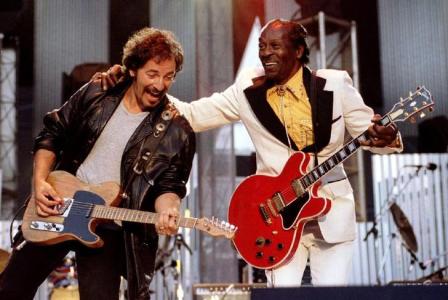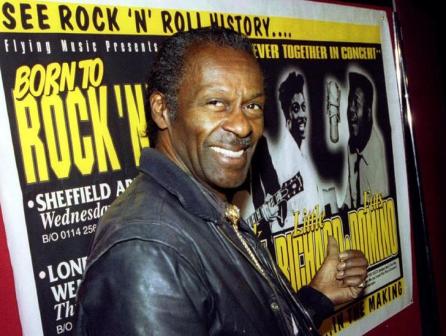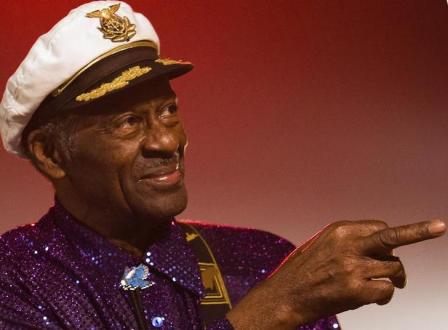
Chuck Berry’s Hail! Hail! Rock ‘N’ Roll is one of the greatest music documentaries of all time, a fascinating insight into the bizarre life of a rock legend. Even though he is one of the producers, Chuck does everything within his power to disrupt the making of the movie. The climax of the film is a 60th birthday concert in Chuck’s St. Louis hometown, with Keith Richards serving as musical director and barely escaping with his sanity intact.
Long out of print, it finally came out on DVD in 2006, with more than five hours of bonus footage. Included is a one-hour documentary, The Reluctant Movie Star, which reveals that Chuck demanded a big bag of cash every day before he would take part in any filming. On the other hand, Chuck is totally mellow in a wonderful conversation with Robbie Robertson. I spoke with the film’s director, Taylor Hackford, who is perhaps best known these days for Ray. When I submitted my story for editing, I supplied a headline along the lines of “The Chuck Berry documentary that became a horror movie.” But it was changed to something more bland. Oh well.
[UPDATE: By the way the film’s producer, Stephanie Bennett, mentioned below, recounted her experiences in the 2019 book Johnny B. Bad: Chuck Berry and the Making of Hail! Hail! Rock ‘N’ Roll.]
WHY DID YOU SIT ON ALL THIS BONUS FOOTAGE FOR SO LONG?
Universal had the film out on video for a number of years and then it went out of circulation, it went out of print and they had no interest in having it out there. When I was doing the film … it was costing them more and more. They came to me and basically — I was into it … and I gave back my fee. But I got the laserdisc rights which ultimately begat the DVD rights … I just want it out there. This is something I financed myself … Like everybody else, like Keith (Richards) and Eric (Clapton) and everybody, I signed on to this as a celebration of somebody who had had a major impact on our lives. So we went there to celebrate him, and we had every expectation to expect a lot of cooperation because he was also a producer. Lo and behold, as you see from “The Reluctant Movie Star,” we found quite a different situation.
WAS HE INVOLVED AT ALL WITH THE DVD?
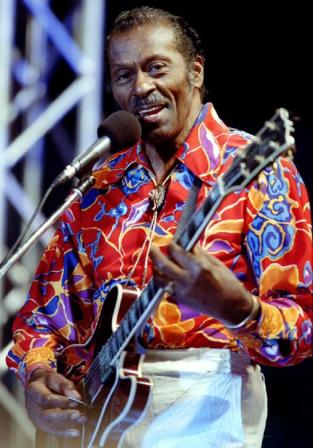 No. Not at all. I have a huge amount of admiration, respect and really love for Chuck Berry. He opened himself up to me — to a degree! There’s nothing about this that’s about denigration. But if you set out as an artist to reveal somebody, it seems to me that what this DVD gave me the opportunity to do was — he’s a complex man, but you get the sense that he’s a lot more complex. I was brought on the project to do a celebration of Chuck Berry’s 60th birthday, and although there’s lots of conflict in the picture — and I ultimately made it a film about Keith Richards and Chuck Berry, that’s the kind of central relationship — it ultimately was a celebration and I cut it that way. This DVD gives you an opportunity to see another side of him that I think is absolutely fascinating and surprising and was not in the feature film. And then beyond that, little things like the rehearsals … I’m thrilled with some of the stuff we did. You see the scorpion, you see the sweet Chuck Berry … with Robbie (Robertson, as they peruse Chuck’s scrapbook and Chuck drops his guard).
No. Not at all. I have a huge amount of admiration, respect and really love for Chuck Berry. He opened himself up to me — to a degree! There’s nothing about this that’s about denigration. But if you set out as an artist to reveal somebody, it seems to me that what this DVD gave me the opportunity to do was — he’s a complex man, but you get the sense that he’s a lot more complex. I was brought on the project to do a celebration of Chuck Berry’s 60th birthday, and although there’s lots of conflict in the picture — and I ultimately made it a film about Keith Richards and Chuck Berry, that’s the kind of central relationship — it ultimately was a celebration and I cut it that way. This DVD gives you an opportunity to see another side of him that I think is absolutely fascinating and surprising and was not in the feature film. And then beyond that, little things like the rehearsals … I’m thrilled with some of the stuff we did. You see the scorpion, you see the sweet Chuck Berry … with Robbie (Robertson, as they peruse Chuck’s scrapbook and Chuck drops his guard).
WHEN YOU FILMED THAT SCENE WITH ROBBIE, YOU MUST HAVE KNOWN AT THE TIME THAT IT WOULDN’T MAKE THE FILM?
The way I conceived the film was that we built this kind of story in between the songs of the concert to reveal the man, and it all fit kinda nicely into short bits. What Robbie did was something that didn’t lend itself to excerpting. It’s not an interview, it’s a conversation, and the conversation has to flow and evolve and grow. I had it, and I decided I wasn’t going to use it. The great thing is, with a DVD, it’s something that needs to be played in its entirety. We watch that half hour and it’s a really fantastic, new revelation about Chuck … There’s a little bit more, I trimmed it down a little bit.
DID CHUCK SEEK MONEY TO SIT DOWN WITH ROBBIE?
In that instance, no. Listen, Chuck got paid hundreds and hundreds of thousands of dollars when the film was made. That was the thing that was so crazy. When he announced to me while we were making the film, ‘Oh by the way, Taylor, tomorrow I won’t be around. I’ve got a gig in Columbus, Ohio.’ That, was in and of itself a shock, but when I told him to cancel, like I say in the DVD, he said, ‘Hell no, I’m getting paid $25 g’s.’ So he could be paid $650,000 to do the film, but he still wanted that extra 25.
SO $650,000 IS THE FINAL FIGURE HE GOT?
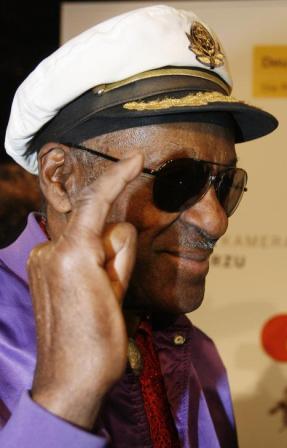 I think it was more than that. I think (producer) Stephanie Bennett talks about it … When you’re caught in the middle of trying to make a movie and you’re being held up, literally every day, I’m sitting there with my camera wanting to shoot, and he’s holding her up. It’s kinda like, ‘All right, whatever it is, I’ll sign it.’
I think it was more than that. I think (producer) Stephanie Bennett talks about it … When you’re caught in the middle of trying to make a movie and you’re being held up, literally every day, I’m sitting there with my camera wanting to shoot, and he’s holding her up. It’s kinda like, ‘All right, whatever it is, I’ll sign it.’
WOULDN’T CHUCK BE SMART ENOUGH TO KNOW THAT ANY ADVANCES WOULD BE RECOUPABLE?
I think Chuck has this thing from the very beginning, he gets his money in cash. That’s the thing, when he goes to that concert, like Springsteen said, here we are waiting to see him and he walks in, gets his money in cash, puts it on stage next to him as he plays, gets it back in the car and drives away.
DID YOU SEE THAT PROCESS TAKE PLACE IN COLUMBUS?
I think at that point, he took cashier’s checks. But he arrived, and here was this group of musicians going, ‘Hey Chuck!’ and he kinda walks right by them. The thing that was great about this is that with Chuck, you had to be improvisational, you had to flow with the punches, because Keith and I had signed on, regardless of all the plans, everything flies out the window with Chuck. So I turn to Oliver Stapleton, who was my DP, and say, ‘Strip everything down. We’re going on the goddamn plane with him, there’s no way that I’m not gonna shoot that.’ And in doing so, we shot this whole process that in a way is revelatory, because this is what he’s done for the last 30 years … The great thing was later when I finally got Springsteen, the story Springsteen told narrated that whole sequence. Springsteen and his band had done it, and here in fact 15 years later, he (Chuck) was still doing it. If you just stay with it, if you don’t let it throw you — that’s the whole idea with Chuck, don’t let him throw you — we ended up by getting at the time the rock ‘n’ roll star in the world to narrate this little thing and add extra meaning.
WAS KEITH INVOLVED WITH THE DVD AT ALL?
No, he was on tour. He, as the musical director, had to approve all the new mixes and so forth for the rehearsals, all of that stuff. The thing is, Keith and I had a great relationship, and ultimately he’s been very supportive. Chuck, by the way, did not have any say. There were some concert songs that we didn’t include that I would have loved to have had. And I called him — and of course I’m doing this myself — so I said, ‘Listen Chuck, I would never ask you for anything for free. I’m going to pay you, which is dear to me, but I’d love to be able to put those songs in.’ Of course, he laughed at me! Everything with Chuck Berry has to do with the dollar sign. But you know what? It’s OK.
WHAT SONGS DID YOU WANT TO INCLUDE?
Oh, “Jo Jo Gunne.” There was about six that we did in the concert that didn’t end up in the film just because of time.
AND HE DID LOOPING FOR ALL THOSE?
He did looping for a couple. I tell you the truth, and in the film, ‘Too Much Monkey Business’ I used the original copy. Even with no voice, he was unbelievably good. Like Curt Sobel says, who was my music editor and has had experience with a lot of looping in feature films, he said Chuck Berry was the best looper he had ever seen. He couldn’t believe it. Of course, he wanted to be paid for it, but he was able to give a very realistic portrayal. The man is an artist. He’s terrific. In any event, I still thought and I do say it in the DVD, with all of this crisis happening with his voice, and all the stuff that was around, he had 5,000 people in one concert and 5,000 people in another, and he was bound and determined to entertain them, and he could do it.
WERE THEY BOTH ON THE SAME NIGHT?
Both on the same night. It was crazy. The first one was supposed to start, I think, at 8 — it got started at 11. The second one started at 2 in the morning. We didn’t finish it until about 3:30. That interview with Keith Richards, I finally sat down at 4:30 in the morning and said, ‘OK, now we’re gonna talk.’ And he said, ‘Fine.’ He grabbed a bottle of Jack, sat down and we had that incredible interview.
IS THERE MORE OF THAT STUFF THAT YOU COULD HAVE USED?
No, I used most of what Keith had to say. It was such a great interview. I thought about running the whole thing because it’s so amazing to see just running straight. But we have five and a half hours of extras and I wouldn’t have had a lot of new material. I used a lot of what Keith has to say because he was my Homer in this.
IT MUST HAVE BEEN AWFUL FOR THE AUDIENCE TO LISTEN TO CHUCK CROAKING (HE HAD LOST HIS VOICE AT THE COLUMBUS GIG)?
You know what? Yesterday, I was talking to Sheryl Crow. Sheryl Crow was from Missouri and she was working as a school teacher in St. Louis at the time. She was there! I was telling her, ‘God, I’m doing this DVD. It must have been tough.’ She said, ‘It was a fantastic concert!’ In the audience, they loved it. Isn’t that amazing? This is somebody who is a pretty damn good singer/songwriter, so you would expect her to be critical. She thought it was a fantastic night … That just goes to show that that the band and Chuck really delivered.
HAVE YOU AND CHUCK CONNECTED OVER THE YEARS, OR ARE YOU ON HIS HIT LIST?
I ended with a great relationship with Chuck. I don’t know how he’ll feel about the DVD, frankly, and my sense is that I do respect and I have a lot of love for him. But in this instance, my job as an artist, it seems to me, is to preserve for posterity a really complicated, very complex individual. Nobody is ever gonna know what really goes on inside that head. No one’s ever gonna do the entire picture of Chuck Berry because it’s just too deep and dark… There’s a lot of material in the DVD that reveals the man even more, which I think just makes him a greater artist.
By the way, he and Keith are not on good terms. What happened in that film, which is also very unusual for a documentary and I think it was quite innocent, Keith at the end was just kinda theorizing, having spent a week working and rehearsing, having Johnnie Johnson. There was that bit where he’d kinda discovered that what Johnnie was doing had a great deal to do with the songwriting. Well, an enterprising lawyer found Johnnie Johnson and they sued Chuck. From that experience were some very bitter moments. Keith was subpoenaed. Somehow the case went away. I don’t know if it was settled, or whatever happened … But I don’t think their relationship is the strongest at this point.
DID YOU SEEK TO GET THE PRISON FOOTAGE OFF HIM? OR IS THAT A LOST CAUSE? (CHUCK CAUSED A MINI-RIOT WHEN HE DROPPED INTO A LOCAL PRISON, AND PLAYED AN IMPROMPTU SHOW TO CALM THINGS DOWN)
Ha! Ha! Ha! That’s a lost cause! Believe me, when I was doing the film, you can imagine, I had pleaded with him to give me that footage. Cos I had it. I have all the stuff that we’re talking about. But it’s very clear, he didn’t want any part of it … I talk to him periodically. He bought a house in Vegas. He’s living part-time in Vegas. That was a long time ago. I checked in with him when I was putting it together which was at the beginning of the year. It was nice. He’s always interesting.
ARE THERE ANY PLANS FOR ANY 80TH CELEBRATIONS?
I have no idea … I think Chuck Berry will just keep going until he falls off this mortal coil. There’s no question about it. He is a unique phenomenon.
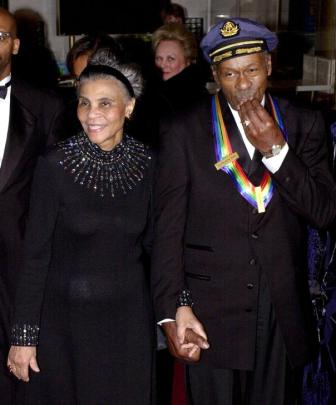 I LIKE THE SCENE WHERE HE SAYS IT WILL 2000 BEFORE HE THINKS OF SEPARATING FROM HIS WIFE, THEMETTA.
I LIKE THE SCENE WHERE HE SAYS IT WILL 2000 BEFORE HE THINKS OF SEPARATING FROM HIS WIFE, THEMETTA.
That’s quite an interesting relationship, anyway, you know! (She and Chuck are pictured at the Kennedy Center Awards in 2000)
SO WHY DID HE CUT YOU OFF AFTER ONE QUESTION WITH HER?
Because he didn’t want her to say anything. I started as a TV journalist. I was a political reporter and things. We won the Peabody Award for a magazine show I did on public television. I know how to do the Mike Wallace thing. And I said to Chuck early on because I realized he was so defensive that if I tried to be too provocative with him, he would just shut up. But the other part of it is that the camera doesn’t lie. The camera reveals, regardless of what someone is trying to hide, what the real nature of them is. So I took the philosophy that I would go down the line and I wasn’t going to fight with him on camera. When I talked to him in the interview about prison, he said, ‘No, no. We’ll do that another time. Not here.’ Did he ever? No! And that moment where he shut the camera off with her, you hear, you know who the character is, you know the controlling nature of that relationship. Inevitably people said, ‘Hackford tried, but did he really reveal?’ I think the camera reveals. And in a way also with the Robbie Robertson interview, he does talk about prison. It was very interesting. And the whole concept of when he went away. The most revelatory thing was when he was 18 and went to prison that’s where he read all that poetry. And that poetry, as strange as it is when he recites it, it still gave birth to all those lyrics. There’s a lot of revelation of the man, I think, and the artist in this piece.
THE FILM DOES MAKE THE POINT OF TALKING ABOUT HIS SONGWRITING PROWESS.
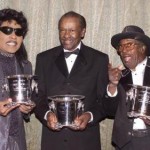 Of all those early people, that’s why he is the greatest. Who can be a better performer than Little Richard? And Jerry Lee Lewis is great. And Bo (Diddley) had all that incredible rhythm stuff. But none of them were writing — Dylan says it, Chuck Berry was a poet … and influenced all those people. Dylan was going to be one of the guests on the show and at the last moment canceled. It’s pretty hard for any substantial artist to say he wasn’t influenced by Chuck Berry.
Of all those early people, that’s why he is the greatest. Who can be a better performer than Little Richard? And Jerry Lee Lewis is great. And Bo (Diddley) had all that incredible rhythm stuff. But none of them were writing — Dylan says it, Chuck Berry was a poet … and influenced all those people. Dylan was going to be one of the guests on the show and at the last moment canceled. It’s pretty hard for any substantial artist to say he wasn’t influenced by Chuck Berry.
DYLAN WOULD HAVE BEEN A PERFORMER OR ONE OF THE INTERVIEWEES?
No, he was going to be a performer.
I GUESS HE WAS GOING THROUGH A PRETTY BAD PHASE THEN, ANYWAY?
Yeah, yeah he was.
AND LIKEWISE I GUESS THAT’S WHY KEITH’S PREFERENCE FOR CHARLIE TO PLAY DRUMS DIDN’T PAN OUT SINCE HE WAS GOING THROUGH HEROIN?
Yeah. I don’t know about that. Steve alludes to that, a bit. Keith was the musical director. I had a lot of input, but ultimately we had a real dividing line. The music was Keith’s bailiwick, and I handled the whole film. Keith was really great in the sense of letting me cut the film the way I wanted. It was a great collaboration between Keith and I. We’re still friends and have a lot of respect for each other. But in a way we were driven together because we were on this ride with this provocateur, and we just had to roll with the punches and try to make it work.
I LOVE THAT SCENE WHERE THEY’RE REHEARSING “CAROL” AND KEITH IS ABOUT TO BLOW UP
That was a very tough moment because it was a humiliating moment where Chuck is taking him to school, and that instance — with the cameras on you — it’s like, ‘Go ahead, Keith. You’re the big rock ‘n’ roll star. Blow up and stomp off.’ Keith just stood his ground. It’s such a wonderful moment. Certainly Keith knew the line. He just was playing it in his own style. Keith didn’t have to prove anything, but what he was there to say was, ‘You’re the man. You’re my man … You wanna shit on me, go ahead.’ I have a huge amount of time for Keith Richards. He’s a mensch in the true meaning of the word. He stands his ground. I don’t have any question in my mind. Mick Jagger is brilliant. He’s a very, very smart businessman. He’s a terrific artist. But the man who leads that band is Keith Richards.
YEAH. WELL, ACTUALLY I THINK IT’S CHUCK LEAVELL. BUT I KNOW WHAT YOU MEAN!
Ha! Ha! By the way, Chuck had just started playing with the Stones. When I made this film, the Stones were broken up. They were apart, and it was ugly. It was a terrible time, and Mick refused to be part of Chuck Berry’s film.
YOU SOUGHT MICK’S INPUT?
Yeah, I met with him personally. He refused.
BECAUSE OF THE KEITH SITUATION?
Well, I won’t even get into that. I’ll just say that he refused, and I think it had equal amounts to with Chuck and Keith … Mick is a very smart, very cool businessman, and I’m sure he has a good relationship with Chuck. They both understand economics very well!!
SPEAKING OF WHICH, HOW MUCH DID THE FILM MAKE IN ITS THEATRICAL RUN?
The film cost … $3 million, a good budget. I don’t think it made that money back in theatrical … I know this, that this DVD experience, I’ve done it as a labor of love … a historic document … You always have some tough battles,. It’s always a war when you’re making a film. This was a huge surprise that it was as complicated and as difficult.
IS IT TRUE THAT CHUCK WAS HITTING ON STEPHANIE?
I don’t think there are many women that have some sort of shape or beauty that Chuck Berry wouldn’t hit on! Let’s just say this, Chuck’s reputation as a Lothario and as somebody who is a major sexual animal is not ill-founded!
IT MUST HAVE BEEN A BREATH OF FRESH AIR TO WORK WITH RAY CHARLES (FOR THE MOVIE RAY)?
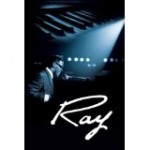 Ray Charles could be really difficult. The thing that was really interesting to me is that Ray is just such a great artist and was an incredible collaborator with me. Was he easy? Absolutely not. But the difference is that I think Ray Charles really did understand his legacy. And I don’t mean that in a horrible, egotistical way. He knew what he’d done and that was that. But I do think he understood his position, he understood that to be able to say, ‘My story can actually say something to people, don’t let anybody tell you you don’t have a shot in life. And anybody can do something.’ And I don’t think Chuck really understands his legacy. I don’t really think he understands how great he really was. He prides himself on being a businessman. He knows he’s a consummate artist. But in terms of his impact and his import I don’t think he gets it.
Ray Charles could be really difficult. The thing that was really interesting to me is that Ray is just such a great artist and was an incredible collaborator with me. Was he easy? Absolutely not. But the difference is that I think Ray Charles really did understand his legacy. And I don’t mean that in a horrible, egotistical way. He knew what he’d done and that was that. But I do think he understood his position, he understood that to be able to say, ‘My story can actually say something to people, don’t let anybody tell you you don’t have a shot in life. And anybody can do something.’ And I don’t think Chuck really understands his legacy. I don’t really think he understands how great he really was. He prides himself on being a businessman. He knows he’s a consummate artist. But in terms of his impact and his import I don’t think he gets it.
DO YOU HAVE PLANS FOR ANY OTHER BIOPICS, OR HAVE CHUCK AND RAY WIPED YOU OUT?
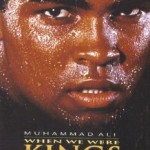 Listen, I did When We Were Kings
Listen, I did When We Were Kings on Muhammad Ali. I didn’t get director credit because I didn’t ask for it but I put that film together. I didn’t shoot it originally, but I had final cut of it. I always make films about working class people. My feature films are all about that anyway. I’m always interested in artists who start from nothing, and through sheer talent and brilliance end up by playing for kings and queens, right? I don’t have anything on my plate at the moment in that area, but I’m always looking. It seems to me that it is inherently great dramatic material.
###
NOTE: Unrelated to the above interview, my gossipy rock bio Strange Days: The Adventures of a Grumpy Rock ‘n’ Roll Journalist in Los Angeles is available here. For more info, go to strangedaysbook.com
Copyright © 2006, 2013 by Dean Goodman. PLEASE DO NOT CUT AND PASTE THE WHOLE THING
